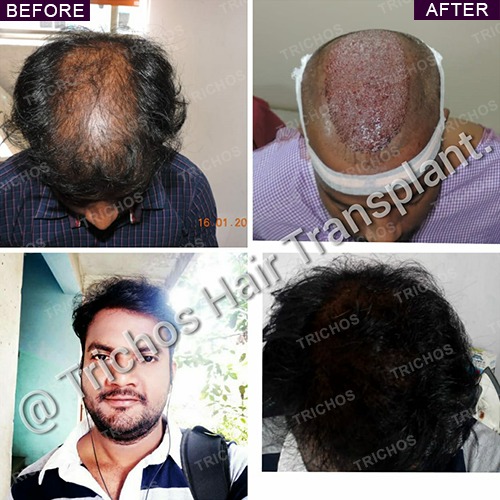Is Baldness Caused by Hormonal Imbalance?
Does deficiency of hormones affect hair growth? Can hormonal imbalance in our body trigger hair loss or even baldness? These are tricky questions that need expert advice and remedial measures.
In this educational video, noted hair Specialist and hair transplant surgeon in Hyderabad Dr John Watts, who has performed over 1900 hair transplant surgeries, clearly spells out how different hormones trigger hair loss conditions and what we need to do to stop its impact.
In his introductory note, he explains that deficiency or excess release of hormones plays a vital role in triggering hair loss conditions or can even halt hair growth if not regulated properly.
“It is true that hormonal imbalance can trigger hair loss. Though all hormones are not responsible, changes in testosterone and Dihydrotestosterone levels can lead to baldness,” informed Dr John Watts.
Hormones: The Roles They Play
The roles played by different hormones and how they are linked to hair loss conditions have been listed by Dr John Watts in detail for the viewers of his popular YouTube channel.
Cortisol Hormone: This is one hormone that plays out badly for our hair when we are stressed. "During stressful situations, they can impact hair growth as the release of this hormone has an adverse effect,” explains Dr John Watts. The adrenal glands produce this hormone. Cortisol triggers hair follicles to go into the inactive catagen phase and may lead to hair fall.
Thyroid Hormone:
Thyroid hormone is required for human growth including the growth of healthy hair but if our body produces it in excess, it may lead to Hyperthyroidism. If it produces less in quantity, it may lead to Hypothyroidism. In either situation, it affects hair regrowth and often results in what’s known as thyroid hair loss.
Irregular secretion of thyroid hormone with even a small fluctuation in thyroid hormone levels can have disastrous consequences, leading to the hair problem.
“The thyroid hormone levels of triiodothyronine (T3) and thyroxine (T4) and TSH need to be regulated if we do not want it to affect hair growth,” informed Dr John Watts, while urging viewers to follow the medical advice given by their endocrinologists in this regard.
He explains that the medication for fixing hormonal imbalance is very affordable and does not affect the pockets.
Estrogen & Progesterone
Both Progesterone and Estrogen are two female hormones that can trigger hair loss when their levels fall. “During pregnancy, these two hormones are active. Hence, we see good hair growth but after pregnancy, their levels come down and it often leads to hair loss conditions,” informed Dr John Watts, while advising regular checks with one’s gynaecologist to monitor their levels.
Testosterone and DHT Hormones
Known as an androgen hormone, the release of too much dihydrotestosterone (DTH) hormone can damage hair follicles, necessitating hair loss treatment.
“If there is genetically-family history linked DHT induced hair loss, this cannot be medically prevented with medicines. The only solution is to go for a hair transplant procedure where hair growing without DHT influence are extracted from the donor region and transplanted,” informed Dr John Watts.
However, Dr John Watts says that if there is intervention when DHT induced hair loss is at an early stage, the process of baldness can be slowed down with medication. “One needs to consult their hair experts for it,” said Dr John Watts, while urging the viewers to share the video among their friends for awareness.
Trichos is a premier hair loss treatment and hair transplant centre in Hyderabad, offering a range of solutions for different hair loss conditions. Please contact us for more information!
Book an appointment for expert guidance


About
Causes
Alopecia
Restoration
Procedures
Locations
Disclaimer: While hair transplants are generally safe and effective, as with any medical procedure, there can be minimal and temporary side effects based on specific or underlying medical condition of the individual patient. Please consult in person with our qualified medical team at Trichos for a thorough assessment of your specific condition and individualized guidance on the potential risks and benefits associated with our hair restoration treatments.
Learn more about Medical Consent for Surgeries.



